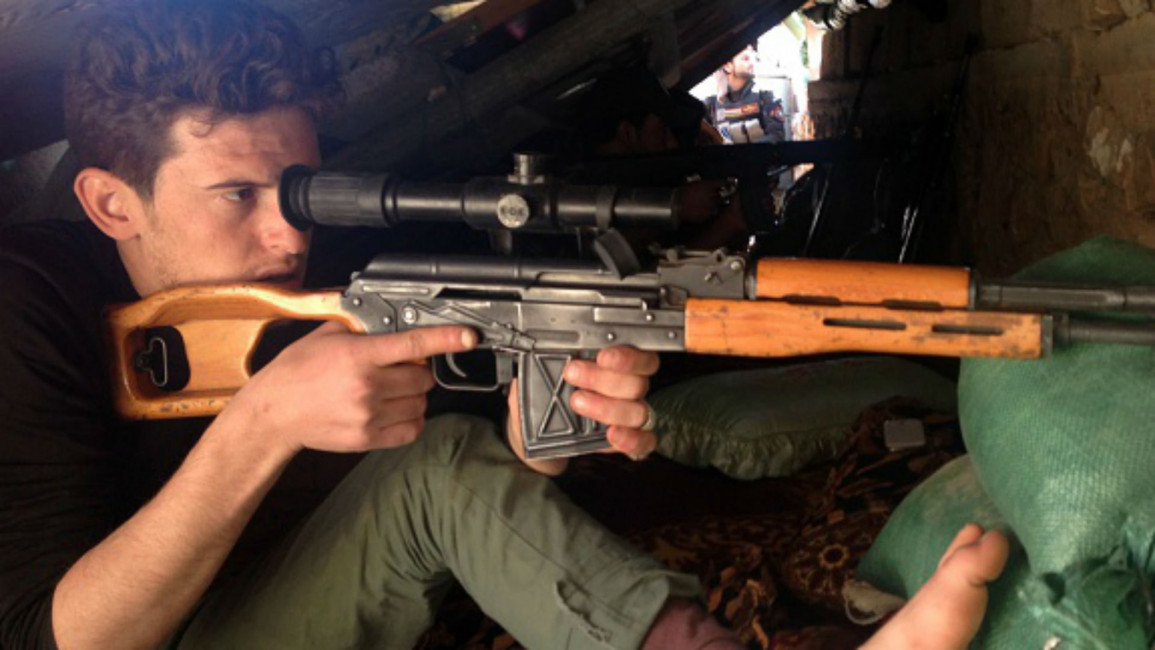Violence escalates in Ramadi as Iraqi forces advance slows
Fighting escalated only about a mile away from IS-held main government buillding in Ramadi as the battle to retake the city from IS intensifies.
Dozens of IS militants have been killed during the military operation which started on Tuesday.
"The Iraqi forces and allied tribesmen will not retreat" Aythawi told The New Arab, "The fighting will continue until the city is completely liberated."
IS may intensify attacks across the entire country to 'distract' Iraq forces from the fighting in Ramadi, said Ghanim al-Aifan, an independent politician from Anbar province in Iraq.
Wave of attacks
A wave of bomb attacks across Iraq killed at least 15 civilians on Wednesday.
In the Shia-majority town of Khalis, about 80 kilometers (50 miles) north of the Iraqi capital, two explosives-laden cars were detonated.
The first car was parked inside a bus station and that explosion killed three and wounded 10, a police officer said.
The second car bomb exploded at the town's outdoor grocery market, killing four civilians and wounding eight.
In and around Baghdad, five bombs went off in commercial areas, killing eight civilians and wounding 35, two police officers said. A number of medical officials confirmed the casualty figures.
All officials spoke on condition of anonymity as they were not authorised to release information.
Iraqi forces have now entered Humayrah and are advancing towards the city, Aythawi told The New Arab on Wednesday.
"Captured areas are being cleared of any explosives left behind by IS militants," he added.
Some fighters are staying behind to defend the newly liberated territories, the source said.
IS militants have held Ramadi since May, when they launched a lightening offensive on the Sunni-majority city.
Protection of civilians
The speaker of Iraqi parliament, Salim al-Jabouri, has called for the protection of civilians in Ramadi during the military assault.
"It is vital that all members of the army, police and allied tribesmen take caution in their strikes to spare any civilian causalities," Jabouri said in a press release.
He has also called on the international coalition to increase air support and intelligence to Iraqi forces on the ground to ensure that Ramadi with minimum losses.
"It is also important to build on this advancement to liberate the entire Anbar province," Jabouri added.
"The chapter to regain Ramadi is almost complete," Mohamed al-Karbouli, member of the Iraqi parliament's security and defence committee, said on Wednesday.
Karbouli called on the Iraqi ground forces and Sunni tribes from the anti-IS "Awakening movement" to "invest in the fall of IS [group]" by maintaining a stronghold in captured areas.
Ramadi was a centre of Sunni resistance during the US occupation of Iraq following the 2003 invasion.
US forces and Sunni Awakening tribesmen freed the city from al-Qaeda-linked militants in 2006, leaving hundreds dead, but leaving Ramadi remarkably safer.
Many of the Sunni Awakening tribesmen were part of the Iraqi insurgency against US and Iraqi government soldiers until they switched sides to fight Islamic extremists who entered the area.
Iraqi ground forces command started its operation to free Ramadi in Anbar province on Tuesday .
IS group has lost control of several key towns in Iraq to government and Kurdish forces since capturing key areas across the country's west and north in June 2014.
The group proclaimed the creation of a "caliphate" in its Iraqi and Syrian territories.
An analysis by IHS Jane's released on Monday says IS group has lost 14 percent of its overall territory in Iraq and Syria, at between 12,800 sq km (4,940 sq miles) and 78,000 sq km (30,116 sq miles) in 2015.
Agencies contributed to this report.



